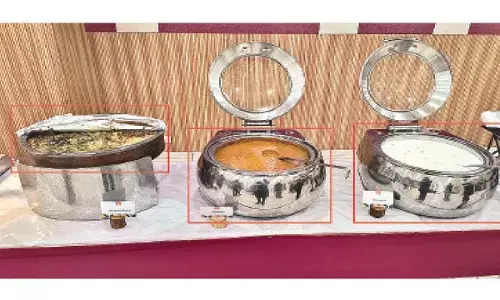For that glossy hair

With the end of blistering summers, monsoons are here again to refresh us, make us feel alive Our body requires maximum care during this highonhumidity weather While we take care of our body and skin but, often neglect our hair when our hair requires more care The humidity in the air causes the hair scalp wet leading to dandruff, brittle and damaged hair
With the end of blistering summers, monsoons are here again to refresh us, make us feel alive. Our body requires maximum care during this high-on-humidity weather. While we take care of our body and skin but, often neglect our hair when our hair requires more care. The humidity in the air causes the hair scalp wet leading to dandruff, brittle and damaged hair.
The high humidity requires regular oiling, shampooing, conditioning to maintain shining, lustrous, long and healthy hair during monsoon. When the melody of monsoon plays on your mind, some little natural precaution will keep your hair nourished and glossy during monsoon.
High humidity poses a problem during the monsoons. The hair becomes limp soon after shampoo. The look of the hair also suffers. It absorbs sweat and tends to swell, becoming matted and rough. Dust and grime in the air also tend to stick to the hair. The salt in your sweat, along with environmental grime, makes the hair rough and robs it of its body and shine.
The kind of dandruff that is sticky and adheres to the scalp is common during the monsoons. The scales, along with oil and sweat secretions, tend to stick to the scalp, making up a condition that needs treatment. The scalp is oily, while the hair is dry and dull.
Sometimes, the flakes may even be yellowish in colour. Certain hair styling products or rich conditioners can also lead to a build-up on the scalp.
For sticky dandruff, hot oil therapy is useful. Heat sesame seed (til) oil or olive oil. Apply the oil on the scalp with cotton wool, rubbing gently to dislodge the flakes. Then dip a towel in hot water, squeeze out the water and wrap the hot towel around the head, like a turban.
Keep it on for 5 minutes. Repeat the hot towel wrap 3 or 4 times. This helps the hair and scalp absorb the oil better. Repeat these three or four times. Leave the oil on overnight. Next morning, apply the juice of a lemon on the scalp and wash your hair after 20 minutes.
Neem leaves: Add two handfuls of neem leaves to four cups of hot water. Let it stand overnight. Next morning, strain the liquid and use it to rinse the hair. It relieves itching and keeps the scalp healthy and free from infections. It is useful in dandruff. A paste can also be made of the soaked neem leaves and applied on the scalp, rinsing off with water after half an hour.
Sometimes sticky dandruff can be accompanied by bad odour during the monsoons. For a fragrant hair rinse, add the juice of a lemon and half a cup of rose water to a mug of water and use as a last rinse.
Oily hair tends to become limp during the monsoons, due to high humidity. Also, hair absorbs moisture from the air and also sweat from the scalp. These tend to make the hair limp, robbing it of body and shine. Straight and fine hair also tends to become limp. A layered cut would help, as it would give the hair more body and bounce.
Shampoo the hair more frequently during the monsoons, especially if the hair is oily. Use a mild herbal shampoo. Rinse your hair well with water, to get rid of all soapy residues and the loosened flakes. Apply egg white on the hair 15 minutes before shampoo. It helps to reduce oiliness and also adds body.
Lemon juice can be added to a mug of water and used as a last rinse. A lemon rinse helps to reduce oiliness and also maintains normal balances. Tea and lemon rinses are also good during the monsoons. Boil used tea leaves again, in enough water. Cool the liquid.
Add the juice of a lemon and use it as a rinse after shampoo. Avoid creamy conditioners. Use a hair rinse. Marigold flowers can be used to prepare a hair rinse. It is particularly useful during the monsoons. Add a handful of fresh or dried marigold flowers to three cups of hot water. Allow it to stand for an hour. Strain and cool the water and use as a final rinse. It benefits oily hair and adds body and shine.








